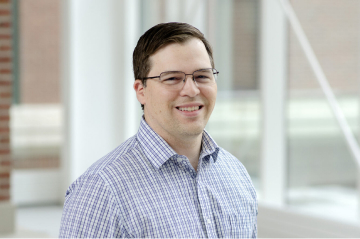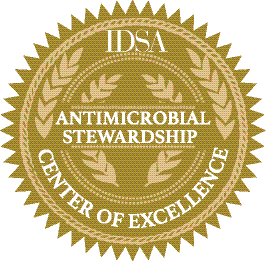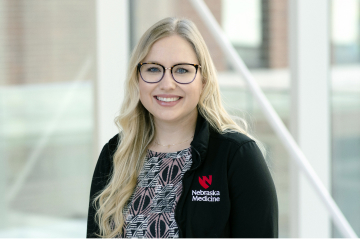
Scott Bergman, PharmD, FCCP, FIDSA, BCIDP
Residency Program Director
Molly Miller, PharmD, BCIDP
Assistant Residency Program Director
The Nebraska Medicine PGY2 Infectious Diseases (ID) Pharmacy Residency offers a unique and stimulating learning environment that balances comprehensive clinical training in antimicrobial stewardship and infectious diseases pharmacy practice. Each resident completing this program will become a highly qualified pharmacy practitioner in the care of patients with infectious diseases by gaining knowledge and confidence in antimicrobial use while improving time management, expertise in complex problem solving and critical thinking skills for patient care. This program's goals and objectives align with the ASHP Infectious Diseases PGY2 Accreditation Standards to develop clinical specialists in antimicrobial stewardship and infectious diseases pharmacy practice.
The resident will be integrally involved with health care professionals throughout the patient care continuum, including patient assessment, education and therapeutic recommendations. Working with knowledgeable pharmacy clinicians, the resident will also gain experience serving as a preceptor for pharmacy students and mentoring PGY1 pharmacy residents. Residents will provide compassionate, progressive, evidence-based medical care. The program allows tailored instruction for the individual based on interests and past experiences.
Comprehensive Pharmacy Activities
Residents participate in all aspects of care for our patients with infections, including:
- Interprofessional medical team rounding.
- Multiple infectious diseases specialty services.
- Internationally recognized Antimicrobial Stewardship Program (ASP).
- Automatic consults for pharmacokinetic dosing of antibiotics.
- Use of Bayesian dosing software and therapeutic drug monitoring.
- Facilitation of care transitions for patients.
- Assessment of core metrics and patient outcomes.
- Development of clinical pathways and protocols.
- Mentorship of community hospitals and nursing homes.
- Education of patients and health care professionals.
- Antiretroviral adherence counseling and pre-exposure prophylaxis (PrEP) instruction.
- Teaching pharmacy students and being a preceptor.
Practice Area
Nebraska Medicine is the clinical partner of the University of Nebraska Medical Center (UNMC), which includes the Colleges of Medicine, Pharmacy, Nursing, Dentistry and Allied and Public Health . With an enrollment of over 4,000 students, UNMC is the only public academic health science center in Nebraska. It is internationally recognized as a leader in patient care, research, and education. The not-for-profit hospital is known for excellence and innovation in medicine.
Nebraska Medicine is licensed for 809 beds between its two campuses and is a Comprehensive Level One Trauma Center. The resident will be based at the Nebraska Medical Center, located on the main academic campus of Nebraska Medicine. As the primary teaching site for UNMC, Nebraska Medicine is a respected leader in blood and marrow transplantation, cardiac and vascular services, oncology, neurosciences, and solid organ transplantation. Nebraska Medicine and the UNMC Division of Infectious Diseases are nationally recognized for their work in antimicrobial stewardship and biocontainment.

In addition to being one of the only sites to care for Ebola virus patients in the United States, Nebraska Medicine is recognized as an IDSA Center of Excellence for Antimicrobial Stewardship and is internationally known for the clinical practice tools shared from the institution’s Antimicrobial Stewardship Program. Recently, Nebraska Medicine established a Remote Antimicrobial Stewardship Support Program to assist small regional hospitals in implementing core elements of a successful program. This builds on the success of the Antimicrobial Stewardship Assessment and Promotion (ASAP) outreach program developed with the Nebraska Department of Health and Human Services to provide support for starting antimicrobial stewardship programs at critical-access hospitals and long-term care facilities. This service was created through a Centers for Disease Control and Prevention grant.
The UNMC Specialty Care Center HIV/PrEP Program is the largest provider of comprehensive HIV care in the region, serving a diverse population in the Omaha metro area along with conducting telehealth visits for those who live in greater Nebraska. The interprofessional team of physicians, pharmacists, APPs, social workers and patient resource specialists works together to provide extraordinary care.
The working relationship between Nebraska Medicine and the UNMC College of Pharmacy provides a solid foundation for a quality pharmacy residency. By combining state-of-the-art research, education and exceptional patient care, we offer the best of academic and clinical practice.
The program provides an excellent mixture of clinical experiences, one-on-one interaction with faculty and clinical preceptors, and the flexibility to modify the program to individual needs. In addition, the residency provides many opportunities for educating and being a preceptor for students. The end result is pharmacy training that actively involves the resident in patient care, leadership, education and research.
"I am so grateful for my PGY2 ID Residency experience because it provided me with all of the learning opportunities one would need to truly succeed. From the diversity of rotations, project/research opportunities, interprofessional team environment and stellar mentorship, I felt like I was set up for success in whatever ID-subspecialty/career I wanted to pursue. Additionally, since the program offers flexibility, it allowed me to focus on certain areas of interest, like HIV. Scott, Molly, and the whole ID preceptor group (including the physicians, APPs, RNs, etc), are excellent mentors who strive to develop each resident into an autonomous clinical practitioner. I couldn't have asked for a better PGY2 ID experience than what I had with Nebraska Medicine."
- Shawna Sunagawa, PharmD, BCIDP, 2022-23 PGY2 Infectious Diseases resident with Nebraska Medicine
Rotations
Rotations are designed to integrate clinical practice, teaching and research. Throughout the year, residents participate in multiple longitudinal experiences to further enhance their training and have the option to complete several additional activities to enhance their learning.
Required rotations
- Orientation to Antimicrobial Stewardship and Clinical Microbiology (July)
- General Infectious Diseases (ID) Teaching Service (3 months)
- Antimicrobial Stewardship (2 months)
- Community ID and Antimicrobial Stewardship Outreach (1 month)
- Community Hospital and Long-Term Care Facility support in collaboration with staff from the Nebraska Department of Health and Human Services.
- Orthopaedic ID and Outpatient Parenteral Antimicrobial Therapy Program (1 month)
- Oncology Infectious Diseases (1 month)
- Solid Organ Transplant Infectious Diseases (1 month)
- Research Project (December and Longitudinal)
Elective rotations (1 month)
- Pediatric Infectious Diseases
- Immunocompromised Infectious Diseases (Additional month of Oncology and/or Transplant ID Service)
Longitudinal experiences (52 weeks, July through June)
- HIV Ambulatory Care Clinic
- Medication Use and Policy (MUE and formulary review)
- Pharmacy Practice and Management (includes staffing Antimicrobial Stewardship Program)
- Interprofessional Education: Teaching and Pharmacy Grand Rounds
Additional opportunities
- Biocontainment Training
- Pharmacy Informatics
- Leadership Development Series and Resident Retreat
- Committee Involvement
- Journal Club and Case Conferences with Infectious Diseases Division
Patient Care Staffing
PGY2 residents must fulfill a service commitment through staffing to ensure that new practitioners gain enough experience to function as competent clinical specialists. Orientation will take place during the first month of residency, during which each resident will train daily with a mixture of infectious diseases physicians and pharmacy specialists. At the conclusion of the orientation period, the designated preceptors and the resident will mutually determine if the resident is ready to function independently as an antimicrobial stewardship pharmacist.
As part of the pharmacy practice and management learning experience for PGY2 residents, the following staffing requirements apply:
- The PGY2 Infectious Diseases resident is required to staff 32 weekend shifts (i.e., every third weekend).
- PGY2 ID resident will also work two holidays.
- Staffing will occur in the resident’s specialty area of training, the Antimicrobial Stewardship Program.
Unique Opportunities
Biocontainment training
Home to the National Quarantine Unit at the Davis Global Center for Health Security, UNMC has led the world in the care of patients with COVID-19. After monitoring the Diamond Princess cruise ship evacuees in February 2020, the first patients in the NIH study of remdesivir were enrolled with Nebraska Medicine. The PGY2 infectious diseases resident will have the opportunity to work with international experts and guideline authors to take care of patients in a team environment, whether it be through drills or actual outbreaks.
Pharmacy informatics
Our Antimicrobial Stewardship Program works with several pharmacists who specialize in informatics to improve clinical decision support. Nebraska Medicine utilizes the Epic Bugsy module to manage infection control and antimicrobial stewardship functions. The PGY2 infectious diseases resident will have the opportunity to collaborate with the pharmacy informatics specialists on projects and learn the logic used to improve clinical efficiency and reports.
Leadership development and Fall Retreat
Committee involvement
Infectious diseases residents actively participate in both the Pharmacy Department and Antimicrobial Stewardship committees. Pharmacy Department assignments are based on preference, and PGY2 residents serve as secretaries for these committees. In the past, Infectious diseases residents have enjoyed contributing to the Patient Safety Council, RAC Research Subcommittee Committee or Pharmacy Intern Clinical Training Program in addition to weekly ASP meetings.
Participation in professional organizations and conferences
Each resident is expected to join the Society of Infectious Diseases Pharmacists (SIDP) and participate on a committee. Funding will be provided to attend their annual meeting and ID Week Scientific Assembly. If previous research is related to infectious diseases, incoming residents are encouraged to submit their projects as an abstract to be presented the year they start PGY2. The goal is for each ID resident to complete their PGY2 research and submit it for presentation at a national meeting the year they graduate. At a minimum, they are required to attend and present PGY2 research findings at the Midwest Pharmacy Residents Conference (MPRC) and UNMC Research Day which is held each spring, unless an alternative presentation is approved by their program director. Each resident in the program will make a brief presentation on their project, which professionals from outside the program will evaluate.
ID Journal Club
Journal clubs are held monthly for infectious diseases, infection prevention, antimicrobial stewardship and clinical microbiology personnel. Residents will participate in these regularly and present at least one journal club formally to faculty and staff during the residency year. This will include a self-evaluation and a formal evaluation. Residents may be asked on rotations to formally present additional journal articles pertaining to the care of patients.
ID Case Conference
A citywide infectious diseases case conference is held weekly at hospitals in Omaha. The resident will attend regularly to learn from the infectious diseases physicians and trainees. These cases revolve around unusual infection topics and include a primary literature review for a case in which the presenting resident or fellow was directly involved.
Teaching opportunities for pharmacy residents
Each PGY2 resident will present one Pharmacy Grand Rounds in the fall to model their presentation skills for the PGY1 residents and students in the audience.
The PGY2 ID resident will teach at least one class and laboratory activity for pharmacy students during the Infectious Diseases section of the Pharmacotherapy course at UNMC College of Pharmacy. Residents on their General ID rotation will also serve as co-preceptors to pharmacy students and mentor PGY1 residents. This experience will build confidence and promote the effectiveness of the resident as a teacher. Residents will work under the guidance of an experienced preceptor and faculty members. These activities will occur even if not enrolled in the Teaching Certificate Program for Pharmacy Residents.
The Teaching Certificate Program is voluntary for PGY2 residents but strongly encouraged if the resident did not complete a similar program as a PGY1. Those seeking a more advanced training can participate in the Health Educators and Academic Leaders (HEAL) curriculum with the Department of Internal Medicine.
Chief pharmacy resident
The chief pharmacy resident is a specialty pharmacy resident (PGY2) who coordinates and keeps track of activities associated with all concurrent pharmacy residents. The chief resident also provides leadership, support and encouragement to all residents as a peer in clinical practice. The chief pharmacy resident serves as the Residency Advisory Committee (RAC) secretary and works closely with all program directors.
Pharmacokinetics fellowship
During the year, residents will have the ability to apply for a fellowship in Pharmacokinetics and Pharmacometrics.
Application information
Submit your application by Jan. 2 following the directions below. More information including salary and benefits can be found on the main residency page.
- Letter of Intent: Maximum 1.5 pages, 12 point font, 0.8 inch margins
Please address the following three questions in your letter of intent:
a. Why are you choosing to complete an infectious diseases pharmacy residency as it relates to your career goals?
b. Why would you like to pursue a residency with Nebraska Medicine?
c. Describe one situation in which you influenced a patient’s medication therapy. - Curriculum vitae
- PhORCAS standardized references
Three standard references are required through PhORCAS.
Two of the references must be from clinical preceptors who can attest to your abilities as a pharmacy professional, commenting on your character, personality, dependability, professionalism and clinical abilities. - Pharmacy school transcripts
Please submit through PhORCAS.
Contact
Contact
Scott Bergman, PharmD, FCCP, FIDSA, BCIDP
Pharmacy Coordinator – Antimicrobial Stewardship, Nebraska Medicine
PGY2 Infectious Diseases Pharmacy Residency Program Director
Clinical Professor – UNMC College of Pharmacy
Phone: 402.559.4149
Email: scbergman@nebraskamed.com
Molly Miller, PharmD, BCIDP
Clinical Pharmacist Practitioner – ID, OPAT and ASP
PGY2 ID Assistant Residency Program Director
Phone: 402.559.8356
Email: molmiller@nebraskamed.com
981090 Nebraska Medical Center
Omaha, NE 68198-1090
